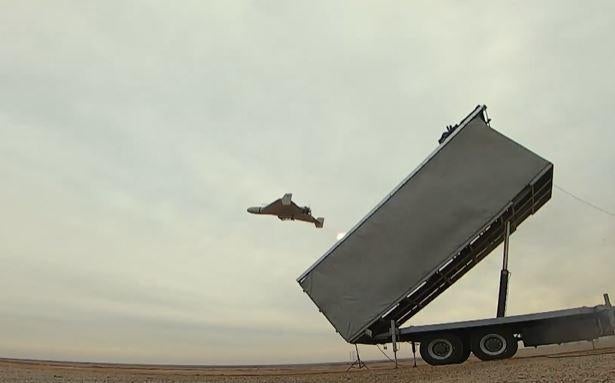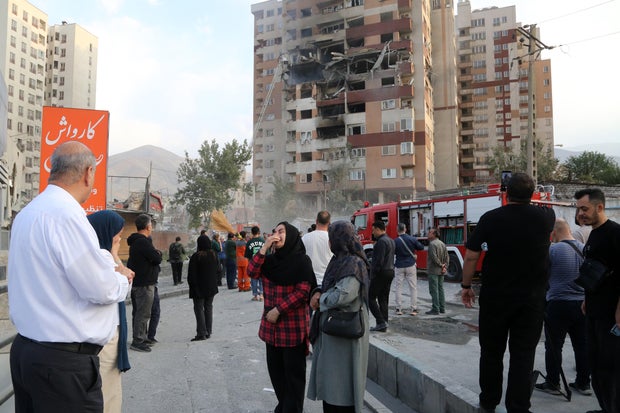Tehran launched more than 100 drones at Israel on Friday morning, not long after Israel announced the beginning of a major operation against Iran, with a wave of airstrikes targeting Iranian nuclear facilities, military commanders and top scientists.
Israel Defense Forces (IDF) spokesman Brigadier General Effie Defin said in televised remarks on Friday that Iran had launched more than 100 drones and that Israel’s air defenses were already “working to intercept the threats.”
Israeli media said the first Iranian drones were expected to reach the country’s airspace around noon local time, which would be about 4 a.m. Eastern, but the IDF confirmed it was already targeting approaching drones outside of Israeli airspace on Friday, amid reports of air raid sirens and possible interceptions in Saudi Arabia and Jordan.
Israel has intercepted virtually every Iranian weapon launched in previous large-scale attacks by the Islamic republic. The retaliatory action by Iran was long anticipated and well planned for, Defin said.
IRGC/Handout
Earlier Friday, Israeli Prime Minister Benjamin Netanyahu announced that the IDF had begun “Operation Rising Lion,” with a massive wave of airstrikes against dozens of Iranian nuclear sites, military commanders and research scientists, saying the goal was to “roll back the Iranian threat to Israel’s very survival.”
Like Netanyahu, IDF spokesman Brigadier General Effie Defrin, in a video statement delivered Friday, called the attack on Iran preemptive, saying Israeli intelligence had uncovered an Iranian “plan to destroy Israel that has taken shape in recent years.” He said that plan involved Iran “racing towards a nuclear bomb,” working to double or triple its ballistic missile stockpile, and continuing to “finance, arm, and operate its proxies throughout the Middle East against the State of Israel.”
Iranian state media said the Israeli strikes hit several cities, including the capital of Tehran and the city of Natanz, a key center for Iran’s uranium enrichment program. The attacks also killed Hossein Salami, the leader of Iran’s Islamic Revolutionary Guard Corps, and other senior figures, Defin said on Friday.
Fatemeh Bahrami/Anadolu/Getty
The United Nations’ nuclear watchdog agency, the IAEA, said in a series of social media posts that its Director General Rafael Grossi had been in contact with Iranian authorities on Friday who told him the country’s highly-sensitive and highly-secured Fordo nuclear site “has not been impacted” by the Israeli strikes.
The IAEA also said Iran’s “Bushehr Nuclear Power Plant has not been targeted and that no increase in radiation levels has been observed at the Natanz site.”
The IDF said its operation would continue for days, but that the first wave consisted of 200 Israeli fighter jets dropping “over 330 different munitions,” hitting more than 100 targets in Iran.
AFP via Getty
Iranian officials had quickly threatened retaliation, with Supreme Leader Ayatollah Ali Khamenei saying Israel “should await a harsh response.”
The IDF said in a statement before Iran’s retaliatory strikes that it had prepared for “a campaign on the frontline and on the home front.”
Netanyahu said Israel’s strikes against Iran, “will continue for as many days as it takes to remove this threat.”
The U.S. was not involved in Israel’s strikes, Secretary of State Marco Rubio said, adding a warning that “Iran should not target U.S. interests or personnel.”
The exchange of fire between the Middle East’s bitter foes quickly snarled international air travel in the region. Dubai International Airport said in a message posted on social media that some flights at the facility, and at Al Maktoum International Airport, “Al Maktoum International Al Maktoum International were “cancelled or delayed due to airspace closures over Iran, Iraq, and Syria.”
The airport said it was “working to manage the disruption and support affected guests,” and urged travelers to check with their airlines for before coming to either airport.
Shortly after Israel’s strikes, the U.S. Embassy in Israel ordered American personnel to shelter in place. A day beforehand, the Trump administration ordered non-emergency U.S. personnel to leave Iraq and allowed U.S. military family members to leave the Middle East voluntarily.
Friday’s back-and-forth could escalate to be among the most severe clash between Israel and Iran, which have been nemeses for decades. Mr. Trump warned earlier in the week that it could snowball into a “massive” conflict.
Israel has carried out strikes against Iranian proxies in recent years, while Iran has backed foes of Israel’s, including the militant group Hamas. In April of last year, Iran launched missiles and drones at Israel after a strike on Iran’s consulate in Damascus was widely attributed to Israel, but the Israeli military intercepted the vast majority of the weapons.
Six months later, Iran launched more missiles at Israel, which retaliated with strikes on Iranian sites.
The Israeli strikes and Iranian counterattack came amid efforts by President Trump to strike a new deal with Iran to limit the country’s nuclear ambitions — an idea Israel has long been dubious of.
The U.S. and Iran are still set to hold talks on Sunday, multiple U.S. officials told CBS News. There was no immediate confirmation from Iran on Friday that it would still take part in those discussions.
Michal Ben-Gal, Seyed Bathaei, Jennifer Jacobs and Olivia Gazis contributed to this report.
































